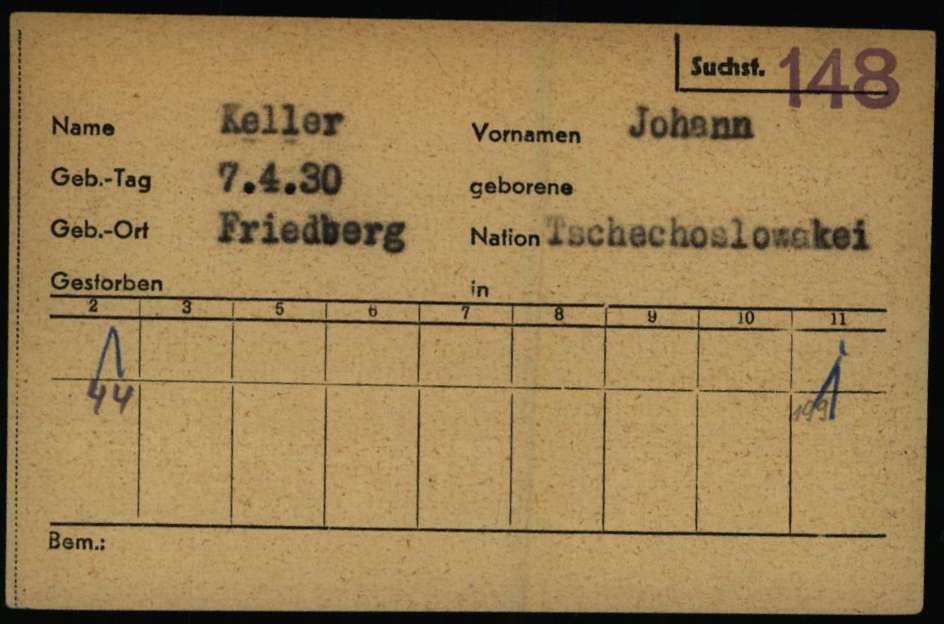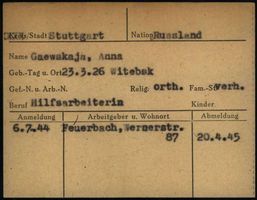Variation
Page of
- Reference


This is a variation of the tracing office cards (Suchstellenkarten) that were created after the end of the Second World War as part of the foreigner tracing campaign (Ausländersuchaktion). In the US occupation zone, each state responded differently to the Allies’ order to compile information on non-German citizens who had been registered there since 1939. This tracing office card was created in the state of Bavaria. Each column represents a different type of list. Column 2, for example, refers to lists of non-German citizens who lived in the respective district when the foreigner tracing campaign was ongoing, i.e. after the end of the war. This was mainly the case for Displaced Persons (DPs). If the person is mentioned in a document, this is noted in the relevant column. The numbers written in pencil were added by staff at the International Tracing Service (ITS), the predecessor institution of the Arolsen Archives. They refer to the folders where the lists were kept. These can be viewed in the Arolsen Archives online collection (Collection 2.1.1.1).
This is a variation of the tracing office cards (Suchstellenkarten) that were created after the end of the Second World War as part of the foreigner tracing campaign (Ausländersuchaktion). In the US occupation zone, each state responded differently to the Allies’ order to compile information on non-German citizens who had been registered there since 1939. This tracing office card was created in the state of Bavaria. Each column represents a different type of list. Column 2, for example, refers to lists of non-German citizens who lived in the respective district when the foreigner tracing campaign was ongoing, i.e. after the end of the war. This was mainly the case for Displaced Persons (DPs). If the person is mentioned in a document, this is noted in the relevant column. The numbers written in pencil were added by staff at the International Tracing Service (ITS), the predecessor institution of the Arolsen Archives. They refer to the folders where the lists were kept. These can be viewed in the Arolsen Archives online collection (Collection 2.1.1.1).

Questions and answers
- What are considered variations in the e-Guide?
The e-Guide distinguishes between main cards and variations. The reason for this is that there are sometimes different versions of a single type of document that can vary significantly.
The documents referred to as main cards in the e-Guide are standard documents that were used especially frequently in concentration camps, DP camps, and for the registration of forced laborers, and about which a good deal of information is available. The Arolsen Archives also hold variations of these documents, however, which served the exact same purpose as the corresponding main cards, but which look different. There are various reasons for this: Some camps used their own individually produced cards instead of the standard versions. In many other cases, individual cards and forms were used before the introduction of standardized pre-printed forms.
- Do you know more about the document?
If you have any additional information about this document or any other documents described in the e-Guide, we would appreciate it very much if you could send your feedback to eguide@arolsen-archives.org. The document descriptions are updated regularly – and the best way for us to do this is by incorporating the knowledge you share with us.